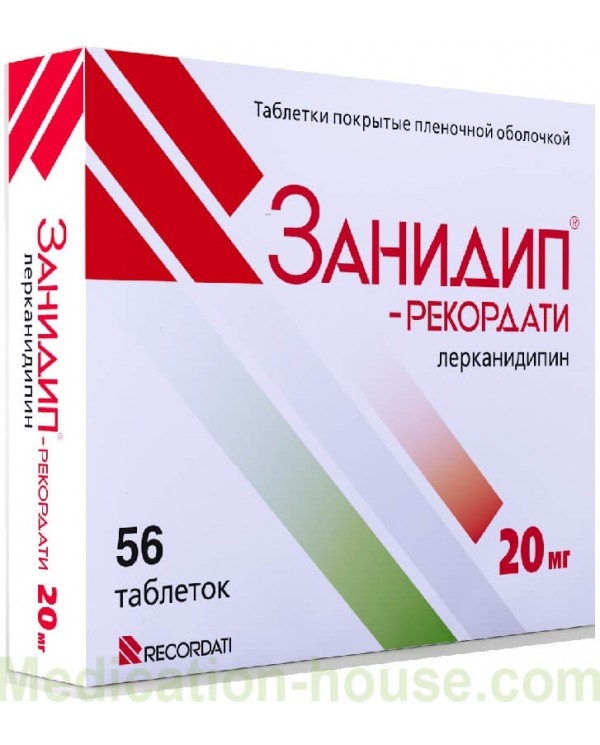Instruction for Zanidip
You can buy Zanidip here
Zanidip-Recordati is a drug with an antihypertensive effect, a calcium channel blocker.
Release form and composition
Dosage form of release - film-coated tablets: biconvex, round, light yellow (10 mg each) or from dark pink to pink (20 mg each), on one side with a risk; the color of the kernel at the fracture is light yellow (7, 14, 15, 25, 28 or 30 pieces in blisters, in a cardboard box 1–7 blisters).
Composition of 1 tablet:
active substance: lercanidipine hydrochloride - 10 or 20 mg;
additional components (10/20 mg): magnesium stearate - 1/2 mg; lactose monohydrate - 30/60 mg; microcrystalline cellulose - 39/78 mg; povidone K30 - 4.5 / 9 mg; sodium carboxymethyl starch - 15.5 / 31 mg;
shell: Opadry yellow (OY-SR-6497) - 3/0 mg; Opadry pink (02F25077) - 0/6 mg.
Pharmacodynamics
Zanidip belongs to the group of slow calcium channel blockers.
Lercanidipine is a racemic mixture of right- and levorotatory (R / S) stereoisomers, a derivative of 1,4-dihydropyridine, capable of selectively blocking the flow of calcium ions into the cells of the vascular wall, into smooth muscle cells and heart cells.
It has a prolonged antihypertensive effect, the mechanism of which is due to a direct relaxing effect on vascular smooth muscle cells. The therapeutic effect develops 5–7 hours after ingestion, and lasts for 24 hours. There is no negative inotropic effect (associated with high selectivity for vascular smooth muscle cells).
Lercanidipine is a metabolically neutral drug that does not significantly affect the serum content of apolipoproteins and lipoproteins in the blood, as well as does not change the lipid profile in patients with arterial hypertension.
Pharmacokinetics
absorption: almost completely absorbed from the gastrointestinal tract. After 1.5-3 hours, Cmax is achieved in blood plasma (after taking 10 mg and 20 mg - 3.3 ng / ml and 7.66 ng / ml, respectively);
distribution: into tissues and organs from blood plasma occurs rapidly. Plasma protein binding - more than 98%; does not cumulate upon repeated use;
metabolism: during the "primary passage" it is metabolized through the liver by biotransformation of CYP3A4 with the formation of a number of metabolites that do not have pharmacological activity;
Excretion: after biotransformation, it is excreted by the intestines and kidneys in 2 phases - early and final (the half-life is 2–5 and 8–10 hours, respectively). It is practically not found unchanged in feces and urine.
Indications for use
Zanidip is prescribed for the treatment of essential hypertension, proceeding in mild to moderate severity.
Contraindications for Zanidip
Absolute:
unstable angina;
chronic heart failure in the stage of decompensation;
obstruction of blood vessels emanating from the left ventricle of the heart;
myocardial infarction, transferred during the previous month of therapy;
impaired renal function (with a glomerular filtration rate <39 ml / min);
violations of hepatic function in severe course;
lactase deficiency, lactose intolerance, glucose / galactose malabsorption syndrome;
combined use with powerful inhibitors of the CYP3A4 isoenzyme (ketoconazole, itraconazole, erythromycin), as well as cyclosporine and grapefruit juice;
pregnancy and the period of breastfeeding;
age up to 18 years;
individual intolerance to the components of the drug, as well as hypersensitivity to other derivatives of the dihydropyridine series.
In addition, the drug should not be taken by women of childbearing age who do not use reliable contraception.
Relative (diseases / conditions in the presence of which caution is required):
chronic heart failure;
mild / moderate hepatic impairment;
sick sinus syndrome (without a pacemaker);
ischemic heart disease and left ventricular failure;
combined use with beta-blockers, digoxin.
Instructions for use of Zanidip-Recordati: method and dosage
The drug is taken orally, in the morning, at least 15 minutes before meals. The tablets are not chewed and washed down with water in sufficient quantity.
The daily dose is 10 mg in 1 dose. Depending on the therapeutic effectiveness, after 2 weeks, it can be doubled.
Elderly patients do not adjust the dose, but this group of patients needs constant monitoring of the condition.
In patients with mild or moderate hepatic / renal insufficiency with a too pronounced antihypertensive effect, the dose is reduced.
Side effects of Zanidip
Possible adverse reactions (> 10% - very often;> 1% and <10% - often;> 0.1% and <1% - infrequently;> 0.01% and <0.1% - rarely; <0, 01% - very rare):
urinary system: rarely - polyuria;
musculoskeletal system: rarely - myalgia;
immune system: very rarely - hypersensitivity;
nervous system: rarely - drowsiness; infrequently - dizziness, headache;
digestive system: rarely - dyspepsia, nausea, diarrhea, vomiting, abdominal pain; very rarely - a reversible increase in the activity of liver enzymes;
cardiovascular system: infrequently - rush of blood to the skin of the face, palpitations, tachycardia; rarely - angina pectoris; very rarely - fainting, marked decrease in blood pressure, myocardial infarction, chest pain;
skin: rarely - skin rash;
others: infrequently - peripheral edema; rarely - increased fatigue, asthenia; very rarely - gingival hyperplasia.
Overdose
The main symptoms: peripheral vasodilation with a pronounced decrease in blood pressure and reflex tachycardia, myocardial infarction, an increase in the duration and frequency of angina attacks.
Therapy: symptomatic.
Special instructions
Due to the likelihood of increased frequency of angina attacks, taking Zanidip for coronary heart disease and impaired renal function, especially in the initial stages of therapy, requires caution.
Before starting the course, chronic heart failure must be compensated.
Influence on the ability to drive vehicles and complex mechanisms
When driving motor vehicles, especially at the beginning of the use of Zanidip-Recordati and when increasing the dose, patients should be careful, which is associated with the likelihood of headaches, dizziness and drowsiness.
Application during pregnancy and lactation
The period of pregnancy and breastfeeding is a contraindication to the use of Zanidip.
Childhood use
The drug is not prescribed to patients under 18 years of age, since the safety / efficacy profile of the drug for this group of patients has not been studied.
With impaired renal function
According to the instructions, Zanidip-Recordati is contraindicated for use in patients with severe functional impairment of the kidneys (at a glomerular filtration rate <39 ml / min).
For violations of liver function
severe disorders: the drug is contraindicated;
mild / moderate severity: the drug should be used with caution.
Use in the elderly
Elderly patients do not carry out dose adjustments, but monitoring of their condition is required.
Drug interactions
With the combined use of certain drugs / substances, the following effects may develop:
inhibitors of CYP3A4 (isoenzyme of liver cytochrome P450), such as itraconazole, ketoconazole, erythromycin: an increase in the concentration of lercanidipine in the blood, which can lead to potentiation of the hypotensive effect (the combination is contraindicated);
grapefruit juice: inhibition of lercanidipine metabolism and potentiation of the hypotensive effect (the combination is contraindicated);
cyclosporine: a mutual increase in the plasma content of both drugs in the blood (the combination is contraindicated);
anticonvulsants (in particular, carbamazepine, phenytoin) and rifamycin: a decrease in the plasma level of lercanidipine in the blood, which may lead to a decrease in its hypotensive effect;
astemizole, terfenadine, quinidine and class III antiarrhythmic drugs (in particular, amiodarone): development of interaction (the combination requires caution);
midazolam (in elderly patients): an increase in the absorption of lercanidipine and a decrease in the rate of its absorption;
digoxin: regular monitoring of signs of digoxin intoxication is required;
cimetidine (> 800 mg daily): increased bioavailability and therapeutic effect of lercanidipine (combination requires caution);
metoprolol: significant decrease in the bioavailability of lercanidipine;
ethanol: enhancing the therapeutic effect of lercanidipine;
simvastatin: development of interaction (lercanidipine should be taken in the morning, simvastatin - in the evening).
The combined use of lercanidipine with diuretics, beta-blockers and angiotensin-converting enzyme inhibitors is possible.
Terms and conditions of storage
Store at temperatures up to 30 ° C. Keep out of the reach of children.
The shelf life is 3 years.
Reviews about Zanidip
According to reviews, Zanidip has an acceptable cost and a fairly high efficiency. Some patients note the development of minor side effects (in the form of dizziness and weakness). It is also noted that additional drugs may be required to achieve a therapeutic effect.
Terms of sell
You can buy Zanidip without a prescription.



